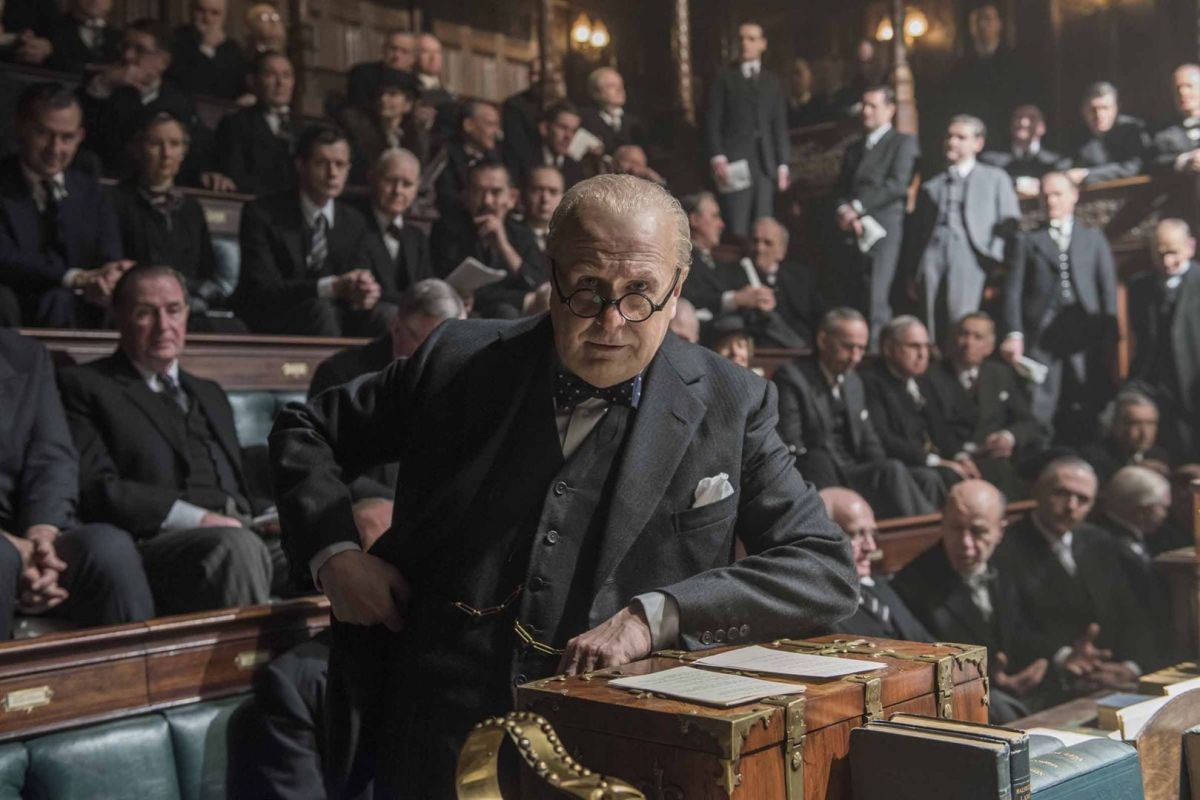Review: Darkest Hour
By Tom Hunter

It’s May 1940. Hitler’s Germany has swept across Europe, and his sights are now firmly set on France. Europe trembles beneath the swastika, as the last of the British troops find themselves at Dunkirk, trapped between the sea and the Nazis. Neville Chamberlain is ousted from government and the only man to fill his shoes, and to do so with Clement Atlee’s approval, is Winston Churchill. You know the stakes; you’ve seen them before in your GCSEs, A-Levels, and countless films before.
And therein lies Darkest Hour’s fundamental problem. Look around you. Spoiler Alert: We won the war. Darkest Hour barely has a plot, because to rely too heavily on it would be equivalent to watching Return of the King first, then going back to Fellowship knowing nearly everyone (sorry Sean) turns out alright. A good film of this genre must have either a good plot, ground-breaking visuals (see: Dunkirk), or an impressive performance. Oldman delivers a spectacular performance, but beyond that Darkest Hour has little else to give. However, it’s testament to its lead that in 120 minutes, I never felt bored.
Despite what the marketing for this film would have you believe, there is a supporting cast. Notably, Ben Mendelsohn gives a remarkably understated performance as King George VI, and joining him in the world of war-time speech impediments is Stephen Dillane, as the usurped candidate Viscount Halifax. Mendelsohn is the star of the background cast, and Dillane brings the same gravitas he gave Stannis in Game of Thrones. Unsurprisingly, given the era, the women take a back seat. While both Kristin Scott Thomas and Lily James (as wife Clemmie and Elizabeth ‘Typewriter woman’ Layton) give some life to otherwise dull moments, it’s hard not to see James as a token inclusion (a shame given her similar ‘non’ character in last year’s Baby Driver).
But it doesn’t matter, as no one is allowed to outshine Oldman; the film simply won’t let them. This is partly because the film doesn’t let him out of your sights for more than a few paltry minutes in its entire two-hour run time. We get snippets of political skulduggery from Halifax and Chamberlain, and a few brief interludes on mainland Europe, mostly revolving around Dunkirk, but beyond that this is Gary Oldman’s film.
Quite simply, he’s phenomenal. He dominates every scene as expected, be it a rousing speech, an inappropriate joke, or simply a conversation between husband and wife. Surprisingly however, Oldman’s Churchill is not infallible. Short-tempered, rude, rash, the range on display here is truly astounding and it’s made all the more impressive by the sheer quantity of prosthetics layered on top of Oldman’s usually distinctive face. Despite the sheer amount, it never seems silly, nor do you ever doubt the authenticity of his performance or his characterisation. It’s remarkable, but not always truthful.
Anyone with access to Wikipedia will know Churchill was far from perfect, not least for his staunch advocacy of the British Empire. Therefore, Darkest Hour is forced to play fast-and-loose with history. For example, given his views on white supremacy, you might question the authenticity of his friendly interaction towards a black man on the London Underground. It’s understandably difficult to market a film of this nature while simultaneously acknowledging such steep pitfalls and, as such, Oldman’s Churchill by necessity has had a slight personality makeover. Whether you see it as a problem is another matter, though if you ask me, the problem lies in the film’s mere existence. Perhaps we should be questioning the necessity of a film glorifying Churchill, now one of Britain’s most controversial figures, in 2018. I’ll leave that up to you.
Whilst watching Darkest Hour, I learned two things. Firstly, any company called ‘Perfect World Pictures’ should never have their name displayed over footage of goose-stepping Nazis. Secondly, Gary Oldman is simply brilliant. Any actor who can bring such an infectious likeability to a character so shrouded in controversy is surely worth of an Oscar. Thank God. Because without him, it’s difficult to recommend.
3/5







